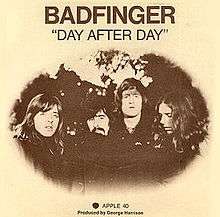Day After Day (Badfinger song)
"Day After Day" is a song by the British rock band Badfinger from their 1971 album Straight Up. It was written by Pete Ham and produced by George Harrison, who also plays slide guitar on the recording. The song was issued as a single and became one of Badfinger's biggest hits, charting at number 4 in the United States and earning gold accreditation from the Recording Industry Association of America.
| "Day After Day" | ||||
|---|---|---|---|---|
 | ||||
| Single by Badfinger | ||||
| from the album Straight Up | ||||
| B-side |
| |||
| Released | 10 November 1971 (US) 14 January 1972 (UK) | |||
| Genre | Pop rock[1] | |||
| Length | 3:02 | |||
| Label | Apple | |||
| Songwriter(s) | Pete Ham | |||
| Producer(s) | George Harrison | |||
| Badfinger singles chronology | ||||
| ||||
Recording
"Day After Day" was written and sung by Pete Ham and produced by George Harrison,[2] who plays some of the slide guitar parts of the song along with Ham.[3] The record also features Leon Russell on piano. As the song was unfinished at the time Harrison left the Badfinger album to produce the Concert for Bangladesh, the final mix was done by Todd Rundgren, who took over Straight Up after Harrison's departure.
Release
Released as a single in the US in November 1971 (January 1972 elsewhere), it would become the group's highest charting single there, peaking at number 4 on the Billboard Pop Singles chart.[4] It also peaked at number 10 on the UK Singles Chart in January 1972. It remains one of the band's best-known songs, most notably for the slide guitar solos. It went Gold in March 1972, becoming the band's first and only gold single. "Day After Day" reached number 10 on Billboard's Easy Listening survey.[5]
Personnel
Badfinger
- Pete Ham – lead vocals, acoustic guitar, slide guitar
- Tom Evans – backing vocals, bass guitar
- Joey Molland – backing vocals, acoustic guitar
- Mike Gibbins – drums, percussion
Additional musicians
- George Harrison – slide guitar
- Leon Russell – piano
Chart performance
Weekly charts
|
Year-end charts
|
Cover versions and other uses
- In 1972, The Lettermen released an album Lettermen 1 with this song on side 1.
- Also in 1972, Engelbert Humperdinck covered the song for his album In Time.
- Also in 1972, The Brady Bunch covered the song on their album Meet the Brady Bunch.
- In 1986, Savatage covered the song on their album Fight for the Rock.
- In 1990, Athens, Georgia rock band Dreams So Real covered the song for their album Gloryline.
- In 1990, synthpop band Exotic Birds covered the song for their album Equilibrium.
- In 2006, Rod Stewart covered the song on his album Still the Same… Great Rock Classics of Our Time.
- In 2006, Neal Morse covered the song on his album Cover to Cover.
- In 2006, an instrumental version of the song can be heard near the end of the ″Join the Club" episode of The Sopranos.
- In 2007, the song was used in a TV commercial for the NBA celebrating the revival of the Boston Celtics.
- In 2007, the song was featured in "Eternal Moonshine of the Simpson Mind", a Season 19 episode of the animated TV series The Simpsons.
- In 2008, Midge Ure covered the song on his album 10.
- In 2019, the song was used in the movie Annabelle Comes Home.
References
- Joe, Bosso (21 November 2010). "Badfinger's Joey Molland on The Beatles, Apple Records reissues and tragedy". MusicRadar. Retrieved 18 July 2018.
- Castleman, Harry; Podrazik, Walter J. (1977). "1971 – My Sweet Lord, He's So Fine". All Together Now – The First Complete Beatles Discography 1961–1975 (Second ed.). New York: Ballantine Books. p. 106. ISBN 0-345-25680-8.
- Rodriguez, Robert (2010). Fab Four FAQ 2.0: The Beatles' Solo Years, 1970–1980 (illustrated ed.). New York: Backbeat Books. p. 41. ISBN 9780879309688.
- Whitburn, Joel (2004). The Billboard Book of Top 40 Hits: Eighth Edition. Record Research. p. 42.
- Whitburn, Joel (2002). Top Adult Contemporary: 1961–2001. Record Research. p. 26.
- "Go-Set Australian charts – 15 April 1972". poparchives.com.au. Retrieved 26 October 2017.
- "The Irish Charts – Search Results – Day After Day". Irish Singles Chart. Retrieved October 8, 2019.
- "flavour of new zealand - search listener". Flavourofnz.co.nz. Retrieved 3 October 2016.
- Whitburn, Joel (2015). The Comparison Book. Menonomee Falls, Wisconsin: Record Research Inc. p. 28. ISBN 978-0-89820-213-7.
- Whitburn, Joel (1993). Top Adult Contemporary: 1961–1993. Record Research. p. 22.
- "Top Pop 100 Singles" Billboard December 30, 1972: TA-3
- "Top 100 Year End Charts: 1972". Cashbox Magazine. Retrieved 1 March 2015.